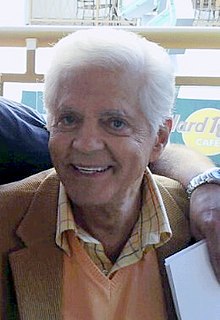See also
- Say It with Music (A Touch of Latin), an album by Ray Conniff
Say It with Music may refer to:
Producer or producers may refer to:

Mary Isobel Catherine Bernadette O'Brien, known professionally as Dusty Springfield, was an English singer. With her distinctive mezzo-soprano sound, she was a popular singer of blue-eyed soul, pop and dramatic ballads, with French chanson, country, and jazz also in her repertoire. During her 1960s peak, she ranked among the most successful British female performers on both sides of the Atlantic. Her image – marked by a peroxide blonde bouffant/beehive hairstyle, heavy makeup and evening gowns, as well as stylised, gestural performances – made her an icon of the Swinging Sixties.

Shirley Mae Jones is an American actress and singer.

American Bandstand, abbreviated AB, is an American music-performance and dance television program that aired in various versions from 1952 to 1989, and was hosted from 1956 until its final season by Dick Clark, who also served as the program's producer. It featured teenagers dancing to Top 40 music introduced by Clark; at least one popular musical act—over the decades, running the gamut from Jerry Lee Lewis to Run–D.M.C.—usually appeared in person to lip-sync one of their latest singles. Freddy Cannon holds the record for most appearances, at 110.

Petula Sally Olwen Clark, CBE is an English singer, actress, and composer. She has one of the longest serving careers of a British singer, spanning more than seven decades.

Rodgers and Hammerstein was a theatre-writing team of composer Richard Rodgers (1902–1979) and lyricist-dramatist Oscar Hammerstein II (1895–1960), who together created a series of innovative and influential American musicals. Their popular Broadway productions in the 1940s and 1950s initiated what is considered the "golden age" of musical theatre. Five of their Broadway shows, Oklahoma!, Carousel, South Pacific, The King and I and The Sound of Music, were outstanding successes, as was the television broadcast of Cinderella (1957). Of the other four shows that the team produced on Broadway during their lifetimes, Flower Drum Song was well-received, and none was an outright flop. Most of their shows have received frequent revivals around the world, both professional and amateur. Among the many accolades their shows garnered were thirty-four Tony Awards, fifteen Academy Awards, two Pulitzer Prizes and two Grammy Awards.
Bronisław Kaper was a Polish film composer who scored films and musical theater in Germany, France, and the USA. The American immigration authorities misspelled his name as Bronislau Kaper. He was also variously credited as Bronislaw Kaper, Bronislaw Kapper, Benjamin Kapper, and Edward Kane.

William Foster Hayes III is an American actor and recording artist. His song “The Ballad of Davy Crockett“ hit the top of the Billboard charts in the spring of 1955.

The Lawrence Welk Show is an American televised musical variety show hosted by big band leader Lawrence Welk. The series aired locally in Los Angeles for four years, from 1951 to 1955, then nationally for another 16 years on ABC from 1955 to 1971, followed by 11 years in first-run syndication from 1971 to 1982. Repeat episodes are broadcast in the United States by Public Broadcasting Service (PBS) stations. These airings incorporate an original program—usually, a color broadcast from 1965 to 1982—in its entirety. In place of the commercials, newer performance and interview clips from the original stars and/or a family member of the performers are included; these clips are occasionally updated.
Alexander Mair Courage Jr. familiarly known as "Sandy" Courage, was an American orchestrator, arranger, and composer of music, primarily for television and film. He is best known as the composer of the theme music for the original Star Trek series.
A parade is a procession of people.

Beryl Cyril Sheldon Jr., known professionally as Jack Sheldon, was an American jazz trumpeter, singer, and actor. He performed on The Merv Griffin Show and participated in episodes of the educational music television series Schoolhouse Rock!, where he became known for his distinctive voice.
For Love or Money may refer to:
A music box is a 19th-century automatic musical instrument.

Keith Joseph Michell was an Australian actor who worked primarily in the United Kingdom, and was best known for his television and film portrayals of King Henry VIII. He appeared extensively in Shakespeare and other classics and musicals in Britain, and was also in several Broadway productions. He was an artistic director of the Chichester Festival Theatre in the 1970s and later had a recurring role on Murder, She Wrote as the charming thief Dennis Stanton. He was also known for illustrating a collection of Jeremy Lloyd's poems Captain Beaky, and singing the title song from the associated album.
George Duning was an American musician and film composer. He was born in Richmond, Indiana, and educated in Cincinnati, Ohio, at the Cincinnati Conservatory of Music, where his mentor was Mario Castelnuovo-Tedesco.
Anything Goes is a musical by Cole Porter.
Anastasia is a female given name of Greek origin, deriving from "Αναστασία", the Greek word for "resurrection", which can also be a surname.
"Tomorrow" is a show tune from the musical Annie, with music by Charles Strouse and lyrics by Martin Charnin, published in 1977. The number was originally written as "Replay" for the 1970 short film Replay, with both music and lyrics by Strouse.

Harry Sukman was an American film and television composer.